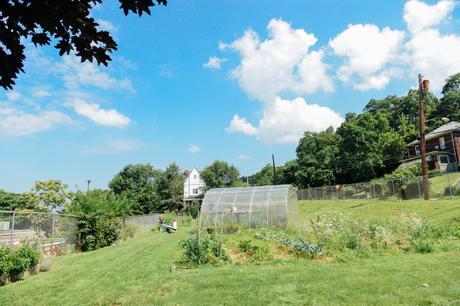
The Hazelwood YMCA Community Garden
Monsanto, GMO’s, hormones, corn syrup, industrialized agriculture, teen diabetes… I could harp and harp and HARP on the wrongs of the food system. I could mourn the ease that used to surround eating, an ease I never fully knew. I could lament the disappearance of family farms and neighborly connections.
However, such an approach is exhausting! That type of doomsday preaching only reaches the choir, and the laundry lists of negatives only remind us how bleak and daunting the world can be. My best friend recently reminded me, “You attract more flies with honey,” so I would like to offer some golden sweetness.
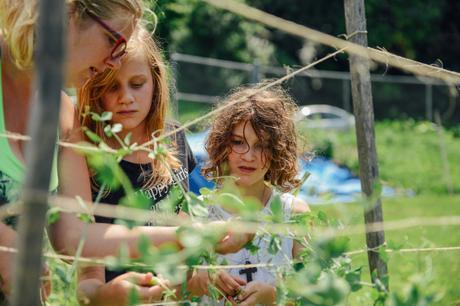
Hanna Mosca, the YMCA Garden Program Director, teaches young girls how to harvest snap peas.
I’ve been so fortunate to meet and befriend several people whose work is filled with passion and drive, who use their talents and energies for the greater good. In an effort to add more positivity to the food dialogue, and as a means of encouraging these inspiring folks to continue their important work, I’m introducing a new series- “A Grain of Good.”
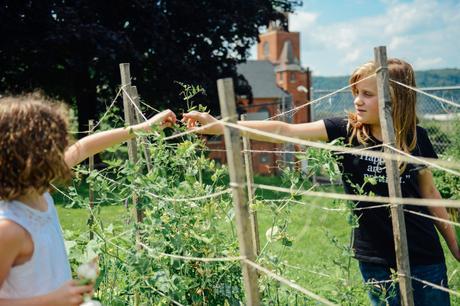
When you “take something with a grain of salt,” you listen with skepticism. With “A Grain of Good,” I am asking you to do the opposite- to receive a message with optimism and inspiration. In this series, I will interview and document the work of community leaders who use food as a vehicle for positive change, and my first inspiring leader is Hanna Mosca.
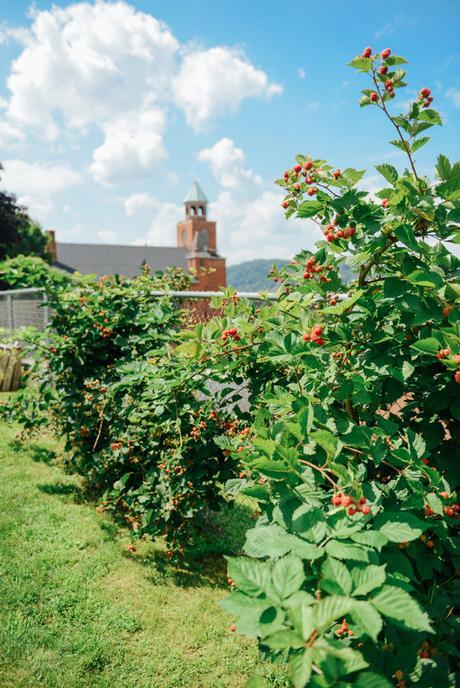
A Grain of Good with Hanna Mosca
Garden Program Director for the YMCA of Greater Pittsburgh
I first met Hanna on a perfectly sunny and warm spring day, when a group of agriculture enthusiasts gathered on the Urban Farmer’s budding farm. Each volunteer had their own farms and garden projects to attend, but they made a point to help one another. I was immediately drawn to Hanna’s warmth and her passion for the work, and I made a point to learn more about her agricultural efforts. The awe and inspiration she draws from her work is so contagious. A few minutes in the garden with Hanna, and your thumb will be visibly greener!
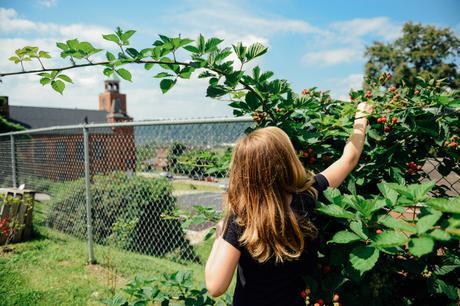
How did urban agriculture start to interest you personally? When did you start diving into urban agriculture?
I grew up on a hobby farm in Wisconsin gardening with my parents. We would just grow what we could eat and share with neighbors. I also gardened at a very young age with my “bubbie,” but I rebelled against most things gardening/composting/canning for a lot of my childhood. It wasn’t until I was in college when I really began to see the importance of the lessons my parents were trying to instill in my sisters and me.
“I began realizing I wanted to do social and environmental justice work through food.”
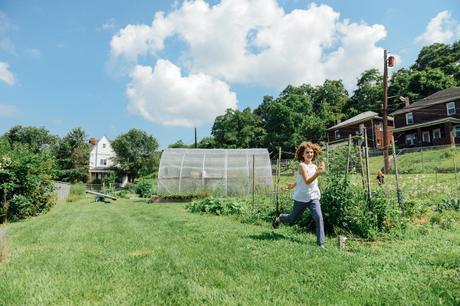
I created my own undergraduate degree at the University of Minnesota, combining Social Justice, Sustainability Studies, and Gender, Women, Sexuality Studies. I wanted to examine all of these major societal issues through a food justice lens, and I focused all of my professional and educational work on urban agriculture early in my college years. I began by working at the student farm, then teaching a high school environmental art class in summer school, and eventually coordinating organic farming classes in the Twin Cities. I have been growing food in cities ever since!

What brought you to Pittsburgh?
I moved to Pittsburgh to earn my Masters in Food Studies at Chatham University. Through that program, I worked at the student farm, taught school field trips and taught summer camps at Phipps Conservatory. While I really enjoyed teaching nature-based programming, I knew I wanted to get back to growing food. Coworkers at Phipps tipped me off to the garden coordinator position at the YMCA, and I knew that was what I needed to be doing! I started full-time with the YMCA earlier this spring as the Garden Program Director.
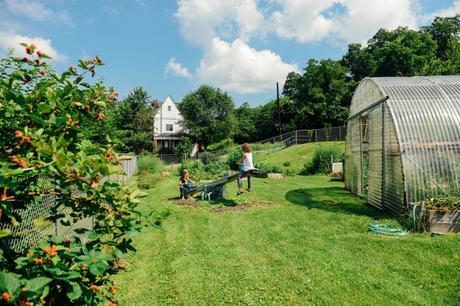
What is the history of the YMCA Garden Program?
We have eight gardens at YMCA’s in the Greater Pittsburgh area. As the Garden Program Director I manage four gardens: Homewood, Hazelwood, the Hill District and Plum. The Hazelwood YMCA was the first of the Ys in Pittsburgh to start an urban garden. Two of the gardens are part of program centers that focus on providing transitional housing for men. These men learn how to care for the gardens and grow their own food.
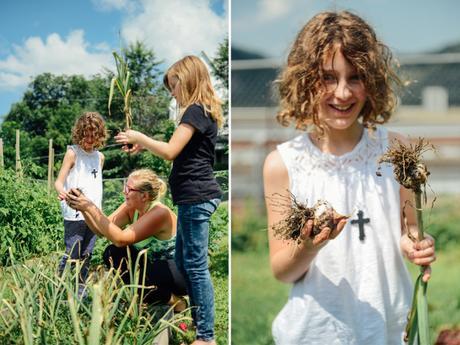
What is the mission of the YMCA garden? What are the educational objectives?
The mission of the YMCA garden program is to increase food security in at-risk communities through providing affordable organically-grown produce and educational opportunities to learn about edible gardening and healthy cooking. The vision of the YMCA gardening program is to bring together community members of all ages in hands-on learning about gardening and cooking.
“The gardens are a natural place to engage communities in every aspect of the YMCA’s mission to help people learn, grow and thrive.”
The edible gardens focus on building capacity by engaging community members in gardening and cooking activities. By bringing people together around important issues surrounding food, the gardens help strengthen communities.
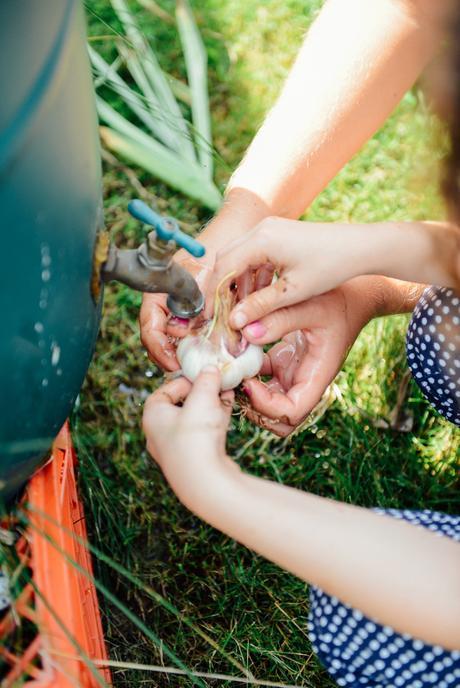
The many garden programs fulfill so many of the YMCA’s goals:
Youth development
The gardens engage young people in the entire process of planting, growing, and harvesting fruits, vegetables and herbs from the organic gardens.
Healthy Living
The gardens encourage and support healthy living by providing fresh fruits and vegetables to communities that have limited access to affordable, local, fresh produce. The gardens are also a great place to be physically active.
Social Responsibility
The gardens contribute to the YMCA’s social responsibility initiatives by increasing food security in communities that are food deserts. The gardens promote healthy lifestyles by supporting the spiritual, emotional and physical well-being of community members.
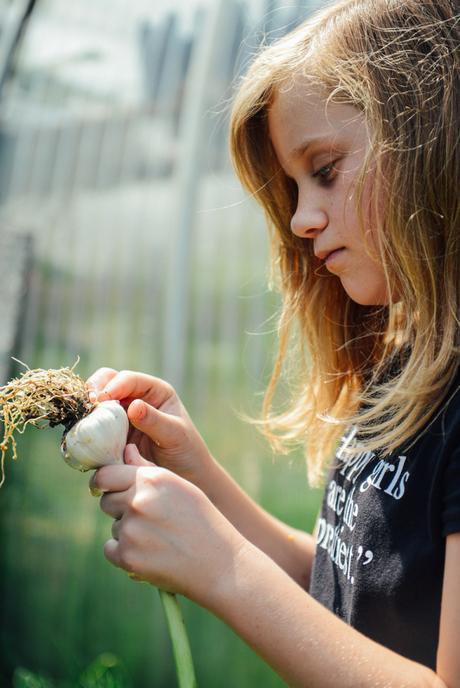
“The urban agriculture community I have been adopted into in Hazelwood is vibrant, motivated and passionate.”
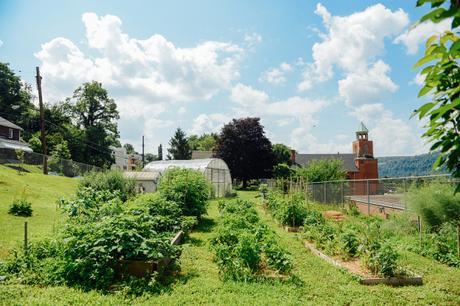
How is the Garden Program funded?
The YMCA relies on the support of donors, foundations and partners to sustain the program in all of the communities we serve. The YMCA Garden Program has been funded by Heinz Foundation, Grow Pittsburgh, Pittsburgh Foundation, RK Mellon and many other important donors.
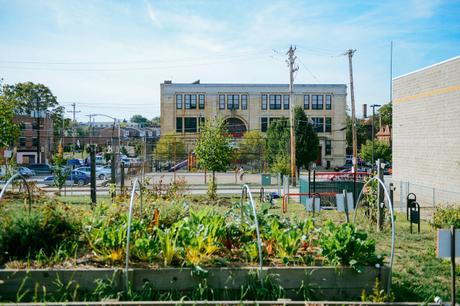
The YMCA garden in the Homewood neighborhood of Pittsburgh.
Describe your urban agriculture endeavor. What do you grow? What do you do with excess?
We grow our gardens organically including best practices of integrated pest management, crop rotation, biodiversity, companion planting, and water conservation.
“The YMCA gardens practice principles of sustainable agriculture.”
We grow lots of different kinds of fruits, vegetables, and herbs in the YMCA gardens. We grow a diversity of different greens, tomatoes, hot and sweet peppers, eggplants, beans, pea, a variety of edible and medicinal herbs and flowers, lettuce, cucumbers, melons and squash. In Hazelwood, our largest urban garden, we also have a small greenhouse and are starting an orchard.
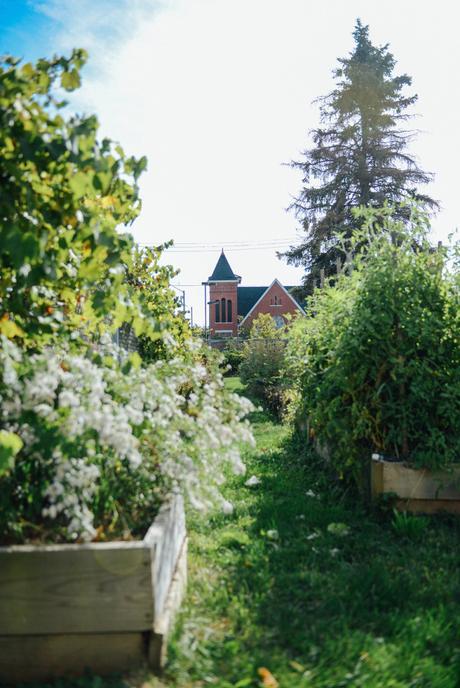
The food grown in the gardens is distributed through a variety of means. We have different strategies for getting food out to community members for each community garden. In Hazelwood, we provide salads on a weekly basis to the community dining lunch program, give food to the youth programs, and sell to Dylamato’s market. In Homewood, we run a weekly farm stand in the summer months at the Y in partnership with Grow Pittsburgh. We also sell produce to local restaurants. YMCA staff and members get to take some of the excess produce, too!

Have you noticed a change in the children who go through the YMCA garden programs? Has their involvement trickled to their families & homes?
I have had the privilege of working with lots of kids through the numerous youth programs through the YMCA. Most of my experience is with high school-aged students, who I get to watch grow into incredible young people. The students I started teaching are now stepping up as leaders of our gardening lessons and guiding newer and younger students. The students often bring food home with them too, and they always love to report back what they made with the produce.

What has been the community reaction to the gardens?
I have hosted a couple of work days in the gardens and have had a lot of great response. Between neighbors of the gardens, community groups and tasks forces in which I participate, the YMCA has lots of wonderful advocates in the community!
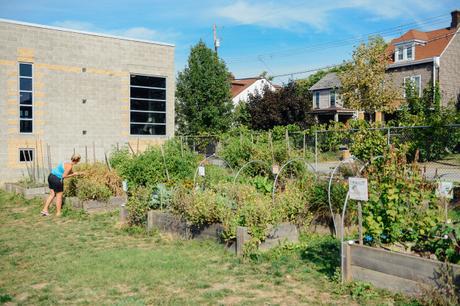
Hanna tending to the Homewood YMCA garden.
Have you seen your efforts influence others to grow their own food?
I don’t know if our work has influenced others to grow their own food, but I have heard people say they have tried new foods because of the things we are growing in the gardens. Between unique varieties and interesting fruits and vegetables, there are lots of new things to discover in our gardens!
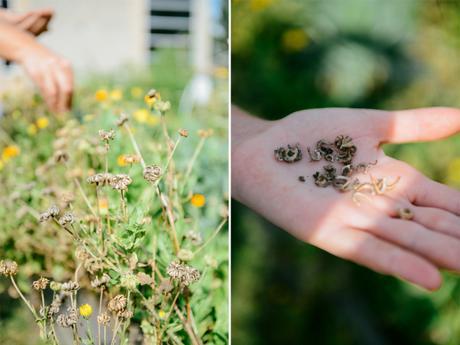
Hanna harvesting the remaining calendula flowers for drying and showcasing their amazing seeds.
“This is the greatest work I could possibly be doing, which makes it all worth it! I have found that it is about balance and doing the best work I can do each day.”
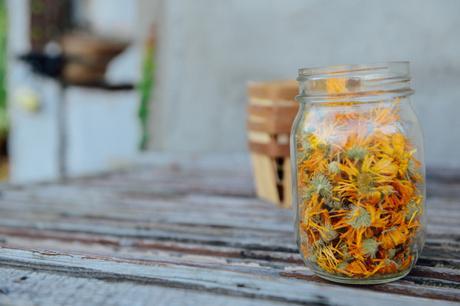
A collection of dried calendula blossoms. In addition to its beautiful blooms and scent, calendula has many medicinal uses.
What have been the biggest hurdles to achieving your urban farming goals? Biggests lessons learned?
Aside from very happy groundhogs living in the hillside of the Hazelwood Y garden, my biggest hurdles are related to time. There are not enough hours in the day to do all of the things I want to accomplish in the four gardens I manage. Part of the pressure is that I have big dreams for the gardens, the other part is that I am trying to coordinate volunteers, promote the program, garden, run a farm stand, etc, etc. This is the greatest work I could possibly be doing, which makes it all worth it. I have found that it is about balance and doing the best work I can do each day.
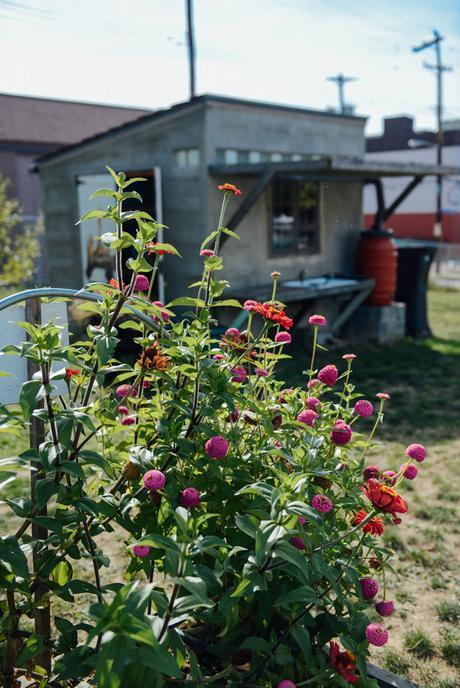
“I know it sounds cheesy, but the biggest reward is seeing kids’ eyes light up when they find ripe fruits and vegetables in the garden.”
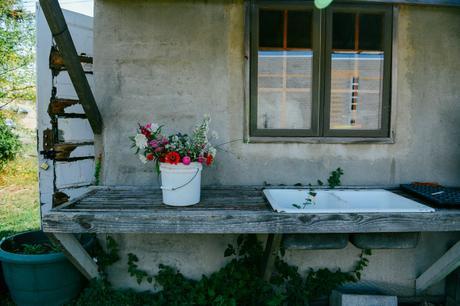
What have been the biggest rewards of the YMCA garden(s)?
I know it sounds cheesy, but the biggest reward is seeing kids’ eyes light up when they find ripe fruits and vegetables in the garden. [Author’s note: I don’t think it’s cheesy at all, Hanna.] We have treasure hunts through the garden and when kids find something that is ripe and ready, the excitement that they possess is contagious. It is really rewarding to see families happy to be going home with produce from the gardens, too!
Personally, it is really rewarding for me to be working outside with kids on a daily basis. I never know what to expect on any given day, and I appreciate that (usually!). I get to get my hands dirty, growing organic fruits and vegetables in Pittsburgh. It is a dream come true for me, really.
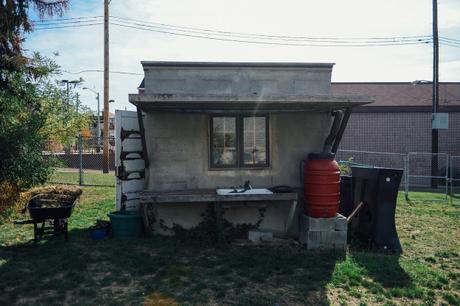
Who inspires you? Who are your urban farming heroes or pioneers you admire?
Will Allen (Wisconsinites unite!). He is such an inspirational man, doing incredible work in Milwaukee. He champions organic, sustainable, urban agriculture through building healthy soil. This work always, always comes back to healthy soils!
On a daily basis though, I am surrounded by inspiring people growing food in Pittsburgh. I have learned so much since moving here a few years ago. The urban agriculture community I have been adopted into in Hazelwood is vibrant and motivated and passionate. I am constantly learning new things from my peers and I am so thankful for that.
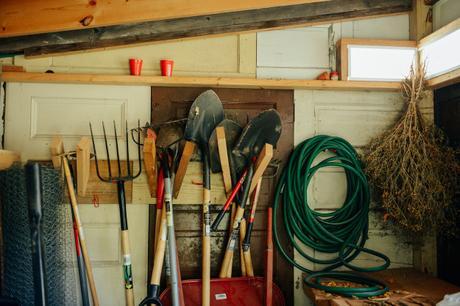
If people want to develop their yard into a garden/urban farm, what resources do you recommend?
[For Pittsburgh residents], Grow Pittsburgh is an incredible resource for people interested in gardening. They have classes, online resources and beautiful gardens all over the city.
How can people get involved? In what areas do you need help?
I would encourage people who are interested in being involved in the YMCA Garden Program to contact me directly! My email address is [email protected]
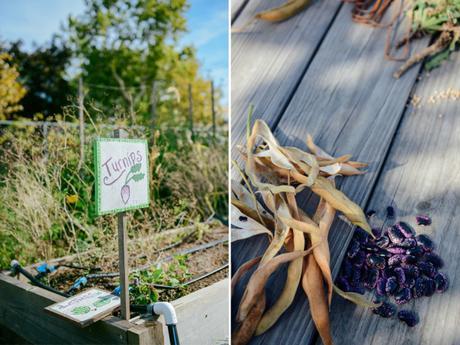
Thank you Hanna for being a Grain of Good!

-Quelcy

